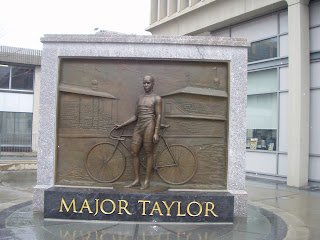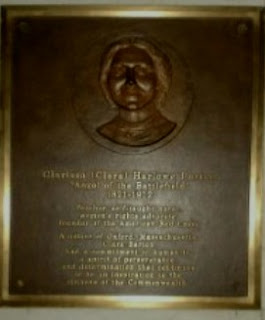Historical Profile: Marshall Walter "Major" Taylor
 |
| The Marshall "Major" Taylor monument at Worcester Public Library |
Taylor won his first bike race in 1892. In the fall of 1895, Louis “Birdie” Munger –the bicycle shop owner moved his business to Worcester, Massachusetts. By 1898, Taylor held seven world records. On August 10, 1899, Taylor won the world 1-mile championship in Montreal. With this victory, Taylor became the second African American world champion athlete. The first was boxer George Dixon. The August 11, 1899 edition of The Boston Globe said that Taylor was a “World Beater.” Taylor was also known as the “Worcester Whirlwind.” Taylor would later say of his world championship victory celebration (when the U.S. national anthem was playing), “I never felt so proud to be an American before, and indeed, I even felt more American at that moment than I ever felt in America. This was the most impressive moment in my young life.”
After becoming a world champion, Taylor traveled to Australia, Europe, and New Zealand competing in cycling races from 1902 to 1904. On March 21, 1902, Taylor married Daisy V. Morris in Ansonia, Connecticut. Together, they had one child, a daughter named Sydney. During his career, Taylor was the most decorated and wealthiest athlete of his time. On August 3, 1899, “Marshall” broke the world 1-mile record, during a race in Chicago, Illinois. This garnered him the title, “fastest bicycle rider in the world.”
Despite his great success as an athlete, Taylor could not avoid becoming impoverished. Taylor retired from competitive racing at the age of 32. Unfortunately, Taylor made some unwise business investments and physical illnesses hampered him as well. Eventually, separated from his wife and impoverished, Taylor moved to a YMCA in Chicago. While in the Windy City, Taylor attempted to sell copies of his 1928 self-published 431-page autobiography – The Fastest Bicycle Rider in the World: The Story of a Colored Boy’s Indomitable Courage and Success Against the Odds.
On June 21, 1932, a couple of years after moving to Chicago, Taylor died at the age of 53 in the charity ward of Cook County Hospital. He was initially buried in an unmarked grave. However, in 1948, Frank Schwinn, owner of the Schwinn Bicycle Company, had Taylor’s remains exhumed and moved to a more dignified area of the Mount Glenwood Cemetery in Illinois. A bronze plaque was also created with the new gravesite. The plaque inscription begins with the sentence: “World’s champion bicycle racer who came up the hard way…”
In 2000, the Major Taylor Association, Inc. based in Worcester, Massachusetts, selected Antonio Tobias Mendez to build a statue in memory of Marshall Taylor. On Wednesday, May 21, 2008 the monument was dedicated at the Worcester Public Library. According to city officials, it is Worcester’s first monument dedicated to an African American. Taylor’s legacy of cycling excellence will endure through generations with the presence of the monument in Worcester. What makes Taylor’s accomplishments so remarkable is that he was a national and world champion at a time when racial segregation was normal. He endured death threats from white bicyclists. However, he continued to “pedal” and forged his name into the history books.
“Life is too short for a man to hold bitterness in his heart.” - Marshall Walter “Major” Taylor


This was yet another great monument I enjoyed seeing. The detail and workmanship of this figure makes Marshall Taylor look so real! He truly was one of a kind...
ReplyDelete